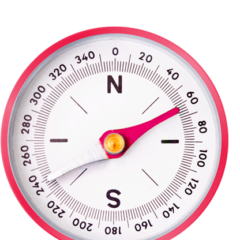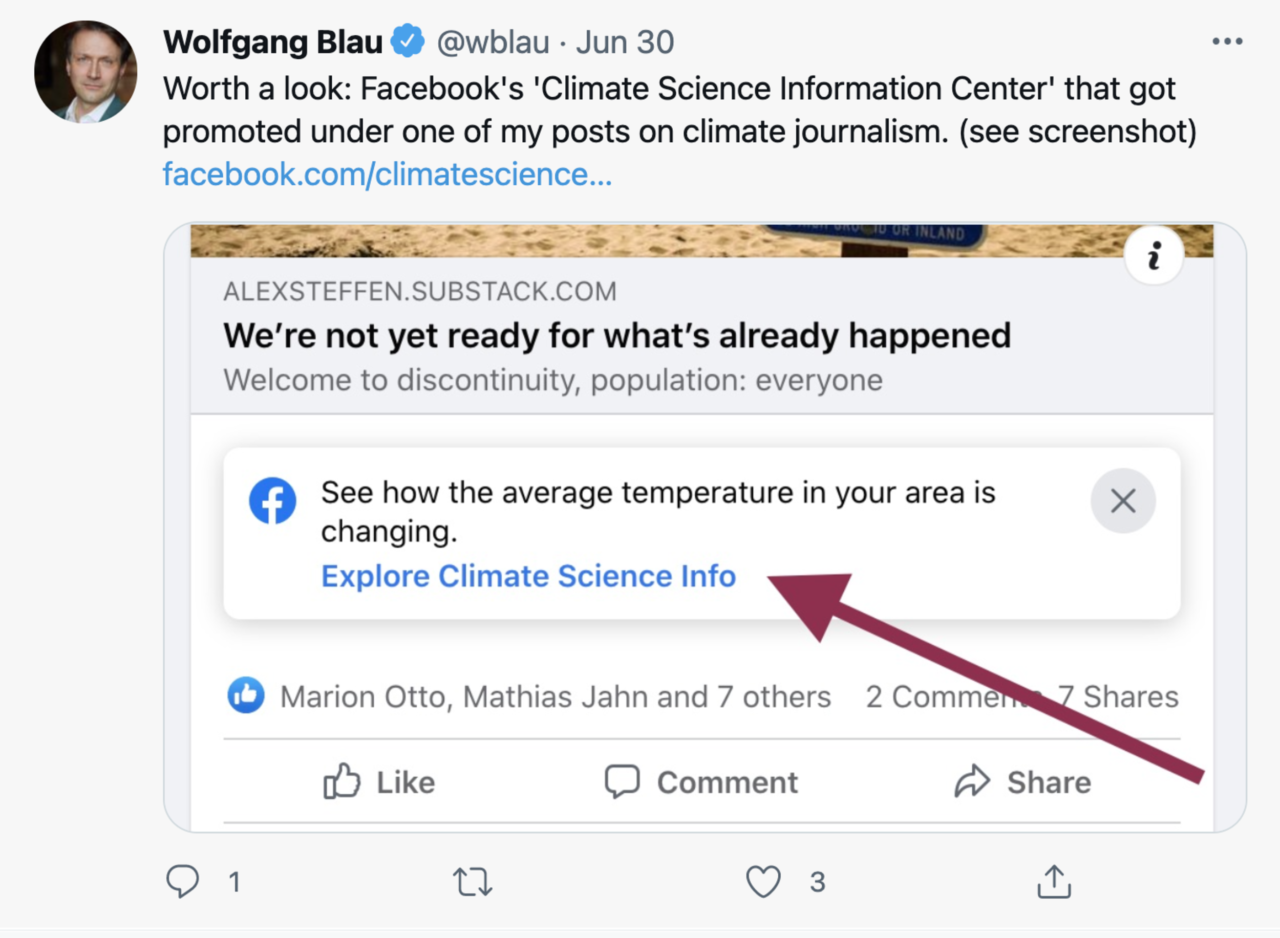Hello, friends,
In September 2020, some six months into the COVID-19 pandemic in the U.S., Facebook announced that it would adapt its strategy for addressing coronavirus misinformation to also address platform chatter on another existential threat: climate change.
In the early days of the pandemic, Facebook launched an on-platform COVID-19 Information Center to distribute official updates about the virus from a prime position at the top of the news feed. Now, it would create a similar information center to distribute news about climate science.
“One of the biggest lessons we have learned from the COVID-19 pandemic is how powerful Facebook can be for connecting people to accurate, expert advice and information during a global crisis,” said an official blog post from Facebook. “Now, we are taking a similar approach to the climate crisis by launching a new Climate Science Information Center on Facebook to connect people to factual and up-to-date climate information.”
In another mirror of its COVID-19 misinformation response, in May 2021 Facebook announced that it would add information labels to “some posts about climate change” that would actively direct people to its Climate Science Information Center.
These labels appear just beneath posts in a platform user’s news feed, with the standard message reading, “See how the average temperature in your area is changing. Explore Climate Science Info.”
But which posts exactly would Facebook label? We decided to look at where these labels occur in our Citizen Browser data—particularly as a freakish heatwave settled across the Pacific Northwest and western Canada in the last days of June.
Few Flags Appeared in Our Dataset
From what we see in the data, the vast majority of climate-related posts did not attract flags.
From June 15 through June 30, our Citizen Browser data captured 364 unique posts that contained the words “climate change,” “heatwave/heat wave,” or “temperature,” 97 percent of which (354) had no flag.
Climate flags were applied to only 26 unique posts. (The flags we saw in our panelists’ news feeds were all the same, standard message pictured above.) We found these posts in the feeds of eight panelists out of a total of 951 who sent us data in this time period. For comparison, flags directing users to the COVID-19 information center were applied to 1,820 unique posts in the feeds of 590 panelists.
The flags appearing on our panelists’ feeds usually accompanied posts that called for action on climate change. Meanwhile, none were attached to posts on our panelists’ feeds that were skeptical about climate change.
Seven of the 26 flagged posts came from climate activist media group Climate Power, while two more came from the Sierra Club, the veteran environment and nature preservation nonprofit. Other posts from climate action groups came from the League of Conservation Voters and the Southern Environmental Law Center.
The climate information flag was also applied to a handful of posts from media outlets’ pages, namely San Francisco Bay Area public radio station KQED and the NOVA documentary series on PBS, both of which posted climate-related stories. Posts of public individuals that were flagged came from environmental writer John Lundin and drag performer Lady Bunny, who shared a Gizmodo article about record ground temperatures in Siberia.
(See our data on GitHub.)
Climate-Change-Skeptical Posts Not Flagged
Of the eight panelists shown posts with climate information flags attached, six voted for Joe Biden in the 2020 presidential election and the remaining two either did not vote or did not give The Markup information about their vote. Climate information flags did not appear in the feeds of any Trump-voting panelists, though some posts seen by these panelists questioned the veracity of global warming or its effects. At the time of the investigation, the panel consisted of 639 Biden voters and 206 Trump voters.
Three of our panelists were shown a post by conservative political commentator Glenn Beck in their feeds linking to a Blaze article that repeated Republican representative Jim Jordan’s claim that Microsoft was censoring conservative voices that (among other things) disputed climate change.
A post appearing on two feeds was a Fox News article that reported on Energy Secretary Jennifer Granholm’s observation that climate change may have been a factor in the Surfside, Fla.,Miami condo collapse. (Though the article is not explicitly climate skeptical, the subhead reads, “Granholm used disaster to push for Biden’s infrastructure package”—a package that Fox star Tucker Carlson has consistently branded a threat to suburban American conservatives.)
Though Facebook announced these steps to combat climate misinformation, the company also profits from advertising that is at odds with climate action. In April, Jeremy Merrill wrote for The Markup on how Facebook’s ad targeting lets companies tailor their messaging to different audiences.
This included fossil fuel companies like Exxon emphasizing sustainability measures to liberal users while suggesting to conservative users that they back the company’s opposition to regulation of the oil and gas industry.
Although FB announced the effort months ago, it says now that climate flags have only been rolled out to some users.
“As we have said publicly, we’re adding and are evaluating informational labels on some posts about climate change seen by a small and random subset of people, just as the Markup’s own data shows,” said Facebook spokesperson Kevin McAlister by email. “The rest of Markup’s claims are meaningless, with a sample size so small, these findings aren’t representative of what people experience on Facebook.”
Citizen Browser Data Roundup
Here are some other trends in the data from June 15 through June 30:
- Top recommended group: The Marriage Club was recommended to 39 percent of our panelists (368 of 951) in this time period. The group’s About page reads, “The Marriage Club was created to promote positive Traditional Marriages. To let society know, they do exist and to bring hope to the world. If you are in need of help, inbox us and we will assist you as we can. LETS LOVE!” To see the top 50 recommended groups in this time period, view the data on GitHub.
- Most commonly seen URL domain: The domain most commonly seen by panelists was youtube.com. Around 84 percent of panelists (797 of 951) received at least one YouTube link in their timeline in the last two weeks of June. The most widely seen YouTube video, shown to 37 panelists, was a clip from The Daily Show in which a correspondent interviewed MyPillow CEO and election fraud claim promoter Mike Lindell.
- Most widely seen ad: The sponsored post that reached most of our panelists came from streaming platform Disney+ and promoted a service bundle that included Hulu and ESPN+. This ad reached just under 16 percent of panelists (149 of 954) in the time period. For a list of the top 20 ads in this time period, see our data on GitHub.
Thanks for reading.
Corin Faife
Data Reporter


